|
|
|
Sort Order |
|
|
|
Items / Page
|
|
|
|
|
|
|
| Srl | Item |
| 1 |
ID:
101473
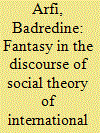

|
|
|
|
|
| Publication |
2010.
|
| Summary/Abstract |
No doubt Wendt's 'Social Theory of International Politics' (STIP) is a discourse. As such, the theory is built on certain discursive conditions of possibility. Drawing on Lacan's theory of discourse, I analyse these conditions of possibility in arguing that a desire of discursive closure is created in STIP through a fantasy. The latter sustains itself not only by pre-empting its own failure but also by maintaining the desire for discursive closure. I argue that STIP cannot escape deploying such a fantasy. More broadly, what social constructivism based on critical realism does, especially in its thin version, is construct a dichotomy between intransitive and transitive objects in its theoretic discourses. It then endeavours, via constructing fantasies, to use transitive discursive objects to sustain the desire for the constructed dichotomies, which hankers for discursive closure. This means that Wendt is more constructivist than he knows, despite his move of 'not going all the way down'. In short, I argue that 'ideas not all the way down' is a discourse all the way down because of what Wendt and thin constructivists struggle to make of it.
|
|
|
|
|
|
|
|
|
|
|
|
|
|
|
|
| 2 |
ID:
111515
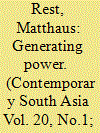

|
|
|
|
|
| Publication |
2012.
|
| Summary/Abstract |
Contested since 1990, the Arun-3 dam in Nepal has so far generated more heat than hydropower involving a host of complex negotiations between its advocates and critics on the local, national and transnational levels. Cancelled after a complaint before the World Bank Inspection Panel in 1995, work is soon to be resumed. An Indian public sector company interested in exporting the electricity to India will finance it. This paper focuses on how local communities have experienced the decade-long uncertainties concerning the project and the approach road to be built. Their hopes of access to markets, electrification and a modern lifestyle will be explored in the context of an understanding of development as a desiring machine and governmentality studies. I will argue for a parallel application of the two approaches to conceptualize the entanglement of desires for development and a deep sense of local powerlessness vis-a-vis external actors.
|
|
|
|
|
|
|
|
|
|
|
|
|
|
|
|
| 3 |
ID:
127142
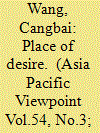

|
|
|
|
|
| Publication |
2013.
|
| Summary/Abstract |
Until very recently the motivation of skilled migration has been largely explained from neo-classically oriented world views coupled with an institutional focus that pays major attention to how skilled migration is driven by (economic) globalisation and sustained by inter- or intra-company economic and social connections. Little is said about how dream and aspiration have shaped migration plans and choices of destination. Although the recent development of academic literature witnesses a shift away from a narrow focus on economic logics to the human face of transnational skills, the issue of desire only accidentally emerges in most discussions. Based on in-depth interviews with mainland Chinese professional migrants in post-colonial Hong Kong, this paper foregrounds the notion of 'desire' as a conceptual vehicle to interweave economic, political and cultural dimensions within the same frame to understand the intentions and dynamics of skilled migration, and to link decision-making at the individual level to a broader geo-politics and geo-economies in which migration takes place. In-depth interviews reveal that apart from economic and career considerations, decisions to migrate were marked by aspiration and fantasy associated with cultural imagination of post-colonial Hong Kong embedded in discourses of place, border and nationhood that go beyond the specific issue of China-Hong Kong migration.
|
|
|
|
|
|
|
|
|
|
|
|
|
|
|
|
| 4 |
ID:
162489
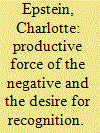

|
|
|
|
|
| Summary/Abstract |
In this article I theorise the concept of misrecognition that we aim to bring to the study of international politics with this Special Issue. I draw upon three sources to do so: recognition theory, Hegel, and Jacques Lacan. I show that, while the seeds of an interest in misrecognition were laid in that interdisciplinary Hegelian scholarship known as recognition theory, it remains underdeveloped. To develop it into a concept I chart a path through recognition theory back to Hegel’s original dialectic of the master and servant in the Phenomenology of Spirit. What the dialectic captures, I argue, are the actual dynamics of misrecognition in social life, not an idealised form of recognition. This foundational, constitutive misrecognition is what Lacan also theorises by way of his concept of ‘fantasy’. Both Hegel and Lacan foreground a misrecognised, desiring subject that challenges the ways in which agency has been understood in international politics. Lastly, I show the purchase of a Hegelian-Lacanian analysis for IR by considering the relations between sovereignty and nuclear weapons under the lens of fantasy.
|
|
|
|
|
|
|
|
|
|
|
|
|
|
|
|
| 5 |
ID:
143547


|
|
|
|
|
| Summary/Abstract |
In this paper, we juxtapose the present-day Supreme Court battles over the colonial anti-sodomy provisions in the Indian Penal Code (Section 377), with everyday interpretations of carnal intercourse by kotis and jananas in order to visibilize a whole different social world of carnality. The responses to the law coming from the civil society formations (namely the lesbian, gay, bisexual and transgender (LGBT) rights organizations, HIV/AIDS organizations and women's rights organizations) are the site for the formation of a modern Indian homosexual subject, one who claims her/his rights to love and privacy through the language of human rights and constitutional freedom. We argue that the arrival of the modern rights-bearing homosexual subject is contested by political and religious formations through discourses of sin, unnaturality and proper sexual conduct. The contestation of religious discourse through the discourse of constitutional rights covers over the creative interpretations of religion provided by kotis/jananas. An analysis of the kotis/janana discourse and bodily practices reveals sexual subject formation through the creative reinterpretation of notions such as sin and unnaturality. In conclusion, we contend that the creative interpretations of religious themes by kotis/jananas trouble nationalist religious discourses as well as the constitutional discourses of the LGBT rights movement.
|
|
|
|
|
|
|
|
|
|
|
|
|
|
|
|
| 6 |
ID:
119232
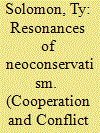

|
|
|
|
|
| Publication |
2013.
|
| Summary/Abstract |
Since 2003, scholars and pundits alike have vigorously debated the role of neoconservatism in the run-up to the US invasion of Iraq. Few, however, have examined the power of neoconservatism in terms of its resonance on an affective level. To more fully understand the influence that neoconservatism has had in recent US foreign policy debates, this article argues that scholarly analyses should also examine what could be termed its discursive efficacy. Neoconservatism incorporates many images and symbols of what many Americans would consider as being 'American', and the affective force of this discourse is vital in understanding its resonance with audiences. Employing insights from psychoanalytic theory, this article argues that a critically under-examined aspect of neoconservatism's varying influence on US foreign policy debates is found in the kinds of identifications that it offers audiences. The article, in this sense, contributes to the growing literature on neoconservatism, and raises the under-explored issue of resonance for the study of security discourses.
|
|
|
|
|
|
|
|
|
|
|
|
|
|
|
|
| 7 |
ID:
157916
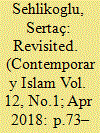

|
|
|
|
|
| Summary/Abstract |
This article locates imaginative aspects of human subjectivity as a feminist issue by reviewing the concept of agency in the genealogy of Muslim and Middle Eastern women in anthropological and ethnographic literature. It suggests that, if feminist scholarship of the Middle East would continue approaching to Muslim women’s agency -as it has been doing for decades-, it should do so as an epistemological question and thus expand the limits of ethnographic and analytical focus beyond the broader systems, such as family, nation, religion, and state. As an example to this proposition, the article then discusses the recent work on aspects of selfhood that escape from the structures, rules, systems, and discursive limits of life but captures imaginations, aspirations, desires, yearnings, and longings.
|
|
|
|
|
|
|
|
|
|
|
|
|
|
|
|
| 8 |
ID:
162087
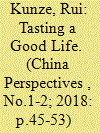

|
|
|
|
|
| Summary/Abstract |
This essay mainly examines the documentary A Bite of China 2 (2014), which presents culinary culture as everyday practices displaying an “authentic” Chinese way of perceiving and pursuing happiness. This is a media artefact produced by CCTV, a cultural institution of postsocialist China, whose duty of promoting state ideology, drive for profit, and the various cultural positionings of its employees negotiated with each other in shaping this audio-visual text characterised by fissures and incoherence. In this text, narratives and counter-narratives of happiness interweave. Their reception is further complicated by an audience made up of various interpretive communities with different social and cultural backgrounds as well as cultural competence. Both the text and its reception reveal that the notion of happiness is complex and contested in such a drastically changing country as China.
|
|
|
|
|
|
|
|
|
|
|
|
|
|
|
|
|
|
|
|
|